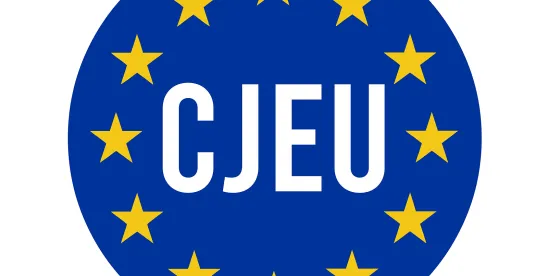In the recent years we have seen exponential increases in the amount of fines imposed by the European Commission (Commission) for infringements of competition rules, fines in the range of hundreds of millions or even billions are not uncommon for hardcore competition violations. In addition, companies that decide to pay these fines upfront (instead of providing a bank guarantee), will have to go through a multi-year appeals process before the EU courts before the final outcome of the case. As a result, the question of whether the Commission needs to pay interest over the the fine–or a portion thereof–that was annulled by the EU Courts is often a multi-million dollar question. A large US semi-conductor company is now claiming more than US$600 million of damages after the EU General Court, after a 15-year appeals process, decided to set aside a US$1 billion fine that was originally imposed by the Commission on May 2009.
Against this background, the recent judgement of the Court of Justice of the European Union (Court of Justice) confirms that the Commission is required to pay interests over unlawfully levied fines. On 11 June 2024, the Court of Justice confirmed that in the event a fine—or a portion of a fine—was unlawfully levied for breach of competition rules, the Commission must return to the defendant not only the fine that was unlawfully levied, but also the “standard rate” of interests (Judgment).1
Background
On 15 October 2014, the Commission imposed a fine of €69.6 million on a Slovak broadband telecommunications services company and on its German parent company (together, Defendant) for abusing their dominance in the Slovak telecoms market by (i) refusing to supply unbundled access to local loops, and (ii) imposing a margin squeeze on alternative operators for a period of five years.2
On 13 December 2018, after the Defendant paid the full amount of fine, the General Court of the European Union (General Court) reduced the fine from €69.6 million to €57.1 million, which meant that the Commission had to reimburse the Defendant for the difference.3 On 19 February 2019, the Commission repaid the Defendant only the nominal value of the difference, amounting to €12 million, without any interest.
On 9 September 2019, the Defendant sought an order from the General Court to direct the Commission to pay interest on the €12 million that the Commission had unduly collected. On 19 January 2022, the General Court awarded the Defendant an interest of approximately €1.8 million,4 and the Commission appealed that judgment to the Court of Justice.
On 23 November 2023, Advocate General Anthony Michael Collins5 sided with the Commission and recommended to the Court of Justice to annul the General Court ruling awarding the €1.8 million interest to the Defendant. Advocate General Collins argued that the General Court erred in law twice. First, the Commission’s obligation to repay a fine is only effective from the date of the judgment reducing or annulling the fine, and not before, so the relevant period for the calculation of interest is much shorter, which is the period between the General Court’s judgment and the repayment of the fine.6 Second, with respect to the rate of interest applied, Advocate General Collins stated that default interest is a punitive rate for the repayment of unduly paid fines.7
The Court of Justice’s Reasoning in the Judgment
The Court of Justice rejected both grounds of appeal of the Commission.
The Court of Justice rejected the first ground on appeal, which was based on Article 266 of the Treaty of the Functioning of the European Union (TFEU), which provides that “[t]he institution, body, office or entity whose act has been declared void or whose failure to act has been declared contrary to the Treaties shall be required to take the necessary measures to comply with the judgment of the Court of Justice of the European Union.” The Commission argued that the General Court’s judgment had misinterpreted Article 266 TFEU by effectively imposing on the Commission an “absolute, unconditional obligation to pay retroactively punitive default interest.”8 The Court of Justice held that the annulment of an unlawful measure is not punitive for the Commission, but it is instead designed to (i) compensate the defendant who unduly paid the fine at a standard interest rate for the loss of enjoyment of the monies owed by the Commission, and (ii) to encourage the Commission to comply with the judgment and reimburse the difference as soon as possible.9
The Court of Justice also rejected the second ground of appeal, which argued that the General Court should not be using the European Central Bank (ECB) refinancing rate increased by 3.5%.10 The Court of Justice found that in the absence of any specific TFEU or other provision specifying a standard interest rate for repayment of unlawfully levied fines, the General Court, in the exercise of its discretion, was free to apply “by analogy” the rate laid down in other legal instruments. In that particular case, the General Court relied on Article 83(2)(b) of Regulation No 1268/2012, which set out the level of compensation of the harm caused to the company, which corresponds to the loss of interest,11 at the rate of 3.55%,12 during the relevant period, on the amount of the fine unduly collected.13 The Court of Justice found that such compensation rate is not unreasonable or disproportionate in the light of the purpose of the interest at issue.14 In the same vein, the Court of Justice rejected the Commission’s argument that the amount of interest payable by the Commission should be capped at that rate of 1.55%, since this cap is only relevant for financial guarantees, which is not the case here, as the Defendant paid the full fine.15
Having rejected both grounds of appeal of the Commission, the Court of Justice rejected the appeal in its entirety.
Comment
The Judgment upholds a principle already set by the General Court in a previous case known as Printeos caselaw16 according to which, in compliance with Article 266 TFEU, any fine (or portion of a fine) that is unduly collected by the Commission shall be repaid back to the defendant together with a compounded interest for the period from the date of payment of that fine to the date of its repayment. The interest would be based on the rate set by the ECB for its principal refinancing operations, plus 3.5%.
The Judgment the Court of Justice emphasized that Printeos caselaw requires that defendants that have been subject to unlawful EU fines are placed in the exact situation as they would have been in the absence of the unlawful action. The Court of Justice concluded that requiring the Commission to repay not only the principal amount of the fine owned but also the compounded annual interest of the ECB refinancing rate plus 3.5% was necessary to (i) compensate at a standard rate for the loss of employment of the monies owed, and (ii) encourage the debtor—in this case, the Commission—to comply with the judgment as soon as possible.
The Judgment is a welcome development for defendants who paid fines that were reduced or annulled by the EU courts. The Judgment has no relevance for situations where defendants did not pay the fine but instead obtained a bank guarantee.
This development might make the Commission even more amenable to accepting bank guarantees, particularly when they impose exceedingly high fines that might be prone to annulment. It is however unlikely that this development will in any way affect the extremely high fines that the Commission has imposed on businesses for substantive or procedural breaches of the EU Merger Regulation or Article 101 TFEU (anticompetitive agreements and concerted practices) and Article 102 TFEU (abuse of dominance).
Footnotes
1 Case C-221/22 P, Judgment of the Court of Justice (Grand Chamber) of 11 June 2024, Commission v Deutsche Telekom AG.
2 Case AT.39523, Decision of the Commission of 15 October 2014, Slovak Telekom.
3 Case T-827/14, Judgment of the General Court (Ninth Chamber, Extended Composition) of 13 December 2018, Deutsche Telekom v Commission.
4 Case T-610/19, Judgment of the General Court (Seventh Chamber, Extended Composition) of 19 January 2022, Deutsche Telekom AG v. Commission.
5 Case C 221/22 P, Opinion of Advocate General Collins of 23 November 2023, Commission v Deutsche Telekom AG.
6 Commission v Deutsche Telekom AG, Opinion of Advocate General Collins, para. 79.
7 Id., para. 94.
8 Commission v Deutsche Telekom AG, Judgment of the Court of Justice, para. 33.
9 Id., para. 52.
10 Id., paras. 71–77.
11 Id., para 82.
12 Article 83 of Delegated Regulation No 1268/2012 provided for several interest rates for different purposes, all of which corresponded to the ECB refinancing rate increased by various percentage points. In particular, it sets that the increase should be:
- 8 percentage points where the obligating event was a public supply and service contract (Article 83(2)(a)).
- 1.5 percentage points where the debtor had provided a financial guarantee which was accepted by the accounting officer instead of payment of a fine (Article 83(4)).
- 3.5 percentage points in all other cases (Article 83(2)(b)).
- The Court of Justice found that the General Court’s decision to apply the third option (i.e., ECB refinancing rate + 3.5%) was appropriate because the harm caused to Deutsche Telekom was sufficiently serious.
13 Commission v Deutsche Telekom AG, Judgment of the Court of Justice, para. 82.
14 Id., para. 84.
15 Id., paras. 85–86.
16 Case T 201/17, Printeos v Commission, Judgment of the General Court (Third Chamber, Extended Composition) of 12 February 2019.







 />i
/>i
